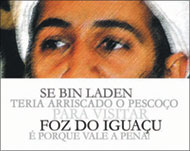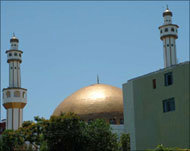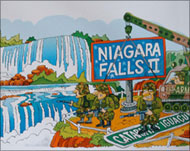‘Terrorist’ claims in the Triple Frontier
Universally acclaimed as nature’s most spectacular spot in Latin America, the giant Iguacu waterfalls attract millions of visitors every year.

They are also an intersection and form the official border between Brazil, Argentina and Paraguay known as the Triple Frontier, historically a busy centre for smuggling.
Ever since a map of the region was discovered in an al-Qaida safe-house in Kabul, Afghanistan, the area has been in the spotlight as a suspected hideout for anyone from Hizb Allah, Hamas to al-Qaida.
The city is home to a large Muslim population and a slew of media reports painted the area as teeming with militants, but there has been no evidence forthcoming.
Now the city tourist authorities are using the negative publicity in tongue-in-cheek adverts that show a mocked-up terrorist and the words: “If bin Ladin would risk his neck to come to Foz do Iguacu, it’s because it’s worth it. Foz, everybody wants to see it. Why haven’t you seen it yet?”
Publicity stunt
When Khalid Shaikh Muhammad, reportedly third in command of al-Qaida, was captured in Pakistan in March 2003, details of a 20-day visit to Foz do Iguacu spilled out.
Soon after the Brazilian Intelligence Agency was reported to say that it believed Usama bin Ladin had been in the area in 1995.
 |
|
Tourist advertising uses Usama |
The spotlight turned on the region for the first time following the attack on the Israeli embassy in Buenos Aires, Argentina, which killed 29 in 1992. A further attack on the Argentine Israeli Mutual Association in 1994 killed 86 people. Since then, all has been quiet.
But the US State Department describes the Triple Frontier region as a “focal point for Islamic extremism in Latin America“.
At the Inter-American Committee Against Terrorism summit of 33 nations on 29 January this year, the US ambassador at large for counterterrorism, Cofer Black, said that the US would allocate another $1.6mn to strengthen border controls.
Concern
Black said that although the area was a concern, there were no proven links to al-Qaida and that “we have not identified any cells”.
|
“A former president of the Brazilian Central Bank stated that about $18mn was laundered daily in Foz“
Mark Steinitz, |
But according to Lieutenant-General Peter Pace, giving a testimony to the US House of Representatives armed services committee in February, Hamas has joined Hizb Allah and al-Qaida in the Triple Frontier.
What few doubt is the existence and the level of money laundering there. The frontier’s free zone sees the third highest number of cash transactions in the region, estimated to be around $12bn.
“In 1999, a former president of the Brazilian Central Bank stated that about $18mn was laundered daily in the banking agencies of Foz do Iguacu,” says Mark Steinitz, of the Washington-based Centre for Strategic and International Studies.
“All of this affords terrorists a lucrative source of income, not only to fund local operations, but also to fill the coffers of their organisations in the Middle East.“
Laughable
But in Foz do Iguacu many Muslims find the suggestion of terrorism either laughable or offensive.
“Hey,” Zaki Mussa, president of the Islamic Cultural Centre of Foz do Iguacu, calls out to the gardener working in the grounds of the city’s mosque. A familiar-looking figure turns round.
“Bin Ladin,” laughs Mussa. “Honestly, that’s his nickname, that’s what everyone around here calls him,” he laughs.
 |
|
The mosque in the Vila Portes |
He beckons inside the mosque, built 20 years ago to service the Muslims among the predominantly Christian Arab population which numbers around 25,000.
“Look, I don’t even know where the key is to lock the door. It’s open all the time. For us we don’t believe in talking about the accusations of terrorism.
“It is something in the past. Our mosque is open, all our places are open. They publish, publish, publish and nothing has been proven,” he says.
Commercial reasons
“Clearly all of this which came out was not an attack on the people, the Arabs, who live here; it is an attack on the region. We live in Brazil, on the frontier of Paraguay and Argentina. We don’t have planes or parachutes to bring a person here to Foz.
“For someone to arrive here they must pass through a border. If you have free transit across Europe, across the US and across Africa, why here?
|
“In the city of Foz, can you see Jews feeling fear in a Lebanese restaurant?” Zaki Mussa, president |
“We felt offended, but the impact was on the region here on this frontier. They spoke badly. In the city of Foz, can you see Jews feeling fear in a Lebanese restaurant? Go past at any hour. Why is the region being attacked here? I don’t know. I’ll leave it for others to say,” he says.
“Clearly there is the presence of the security services here from the whole world, not only the US. If they think something is happening here, they need to show it. It’s not a joke for us. It’s their job. But they will not find what they are hoping to find, I think,” he says.
Two major events altered the landscape of the region. The first was the construction in 1985 of the Itaipu dam, the largest hydroelectric dam in the world, bringing millions of dollars into the area and a sudden rise in the local population. The second was the creation of the free trade area of Cuidad del Este, a bus ride over the border in Paraguay.
“In this region, if you sell some North American projects, you won’t hear talk of terrorism here.
Free market
“Cuidad del Este is the second biggest free market on the planet and if they are selling Asian produced goods or goods from other countries, they try to dirty the waters with talk of terrorism. It’s a huge coincidence,” says Rogerio Romano Bonato, head of Art Natural, who created the spoof bin Laden tourist adverts under the banner of The Friends of Foz against Sensationalist Terrorism.
|
“It’s a psychotic, frenetic, crazy invention to look for things that are not there” Rogerio Romano Bonato, |
He is indignant at the continuous finger-pointing. “It’s a psychotic, frenetic, crazy invention to look for things that are not there. In truth, we believe what is happening here is a commercial game.
“After the bombing in 1994, the Argentine government put up $3mn for information. Everybody was looking for them, I was looking for them. Nobody found anything.
“Here we have an ocean of freshwater, Agua Guarani, which could sustain the whole planet for more than 50 years. This was all started with an eye on the water reserves. It’s a way to dominate our situation, the same as in Amazonia.
Injustice
“We need to ridicule these orchestrated campaigns. So anything that happens in the world, the same day put us on the map of war. It’s an injustice.”
Bonato set up the city’s first international comedy festival, Humour At The Falls, as an attempt to highlight his point.
 |
|
A cartoonist ridicules US claims |
The high-profile event attracted 2500 cartoons on the theme of Planet Agua from 78 countries and gave out $60 million in prizes. A typical one shows the US military by the waterfalls replacing Foz do Iguacu with one that reads Niagra Falls II.
Maurico do Amaral Lupion, executive director of the Iguacu Convention Visitors’ Bureau, agrees.
“Everything which the US does in other countries, it prepares before. Inventions. One day the world will run out of water and here we have lots. It’s absurd to suggest that there is a terrorist training camp for wars here.
“It’s a peaceful region, where many different people live without conflict. We have mosques, Buddhist temples, Catholic churches. There is no conflict. But it’s very difficult to fight against these huge businesses of communications,” he says.